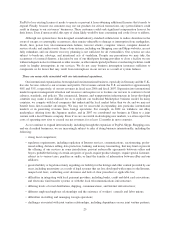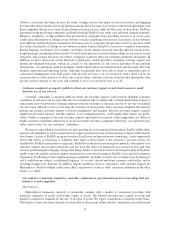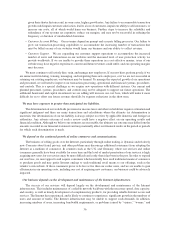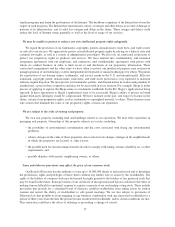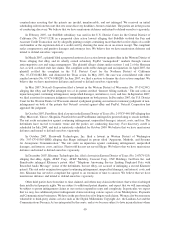eBay 2007 Annual Report Download - page 41
Download and view the complete annual report
Please find page 41 of the 2007 eBay annual report below. You can navigate through the pages in the report by either clicking on the pages listed below, or by using the keyword search tool below to find specific information within the annual report.software, storefronts that help our users list items, caching services that make our sites load faster, and shipping
providers that deliver goods sold on our platform, among others. In some cases we have contractual agreements with
these companies that give us a direct financial interest in their success, while in other cases we have none. PayPal is
dependent on the processing companies and banks that link PayPal to the credit card and bank clearing networks.
Financial, regulatory, or other problems that prevent these companies from providing services to us or our users
could reduce the number of listings on our websites or make completing transactions or payments on our websites
more difficult, and thereby harm our business. Price increases by companies that provide services to our users could
also reduce the number of listings on our websites or make it more difficult for our users to complete transactions,
thereby harming our business. For example, we believe recent changes in postal rates that affected certain lower-
weight packages and mailings between the U.S. and Canada may have reduced listing volume on our sites in certain
categories. Any security breach at one of these companies could also affect our customers and harm our business. In
addition, we have outsourced certain functions to third-party outside providers, including customer support and
product development functions, which are critical to our operations. If our service providers do not perform
satisfactorily, our operations could be disrupted, which could result in user dissatisfaction and adversely affect our
business, reputation and operating results. Although we generally have been able to renew or extend the terms of
contractual arrangements with third parties who provide services to us on acceptable terms, there can be no
assurance that we will continue to be able to do so in the future, and there can be no assurance that third parties who
provide services directly to our users will continue to do so at reasonable rates or at all.
Customer complaints or negative publicity about our customer support or anti-fraud measures could
diminish use of our services.
Customer complaints or negative publicity about our customer support could severely diminish consumer
confidence in and use of our services. Measures we sometimes take to combat risks of fraud and breaches of privacy
and security have the potential to damage relations with our customers or decrease activity on our sites by making
our sites more difficult to use or restricting the activities of certain users. These measures heighten the need for
prompt and accurate customer support to resolve irregularities and disputes. Effective customer support requires
significant personnel expense, and this expense, if not managed properly, could significantly impact our profit-
ability. Failure to manage or train our customer support representatives properly could compromise our ability to
handle customer complaints effectively. If we do not handle customer complaints effectively, our reputation may
suffer and we may lose our customers’ confidence.
Because it is providing a financial service and operating in a more regulated environment, PayPal, unlike eBay,
must provide telephone as well as email customer support and must resolve certain customer contacts within shorter
time frames. As part of PayPal’s program to reduce fraud losses and prevent money laundering, it may temporarily
restrict the ability of customers to withdraw their funds if those funds or the customer’s account activity are
identified by PayPal’s risk models as suspicious. PayPal has in the past received negative publicity with respect to its
customer support and account restrictions, and has been the subject of purported class action lawsuits and state
attorney general inquiries alleging, among other things, failure to resolve account restrictions promptly. If PayPal is
unable to provide quality customer support operations in a cost-effective manner, PayPal’s users may have negative
experiences, PayPal may receive additional negative publicity, its ability to attract new customers may be damaged,
and it could become subject to additional litigation. As a result, current and future revenues could suffer, and its
operating margins may decrease. In addition, negative publicity about or experiences with customer support for
Marketplaces, PayPal or Skype could cause eBay’s reputation to suffer or affect consumer confidence in the eBay
brands as a whole.
Our industry is intensely competitive, and other companies or governmental agencies may allege that our
behavior is anti-competitive.
Marketplaces
Marketplaces businesses currently or potentially compete with a number of companies providing both
particular categories of goods and broader ranges of goods. The Internet provides new, rapidly evolving and
intensely competitive channels for the sale of all types of goods. We expect competition to intensify in the future.
The barriers to entry into these channels are relatively low and current offline and new competitors can easily launch
31






